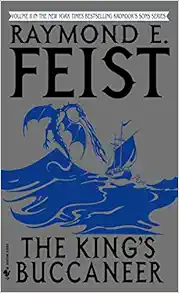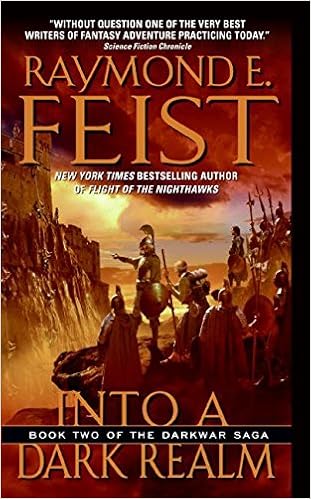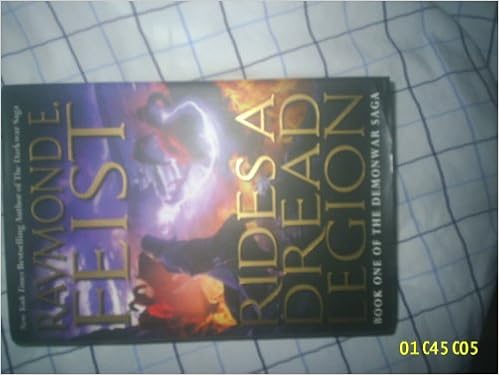
Exile's Return: Conclave of Shadows: Book Three (Conclave of Shadows, 3)
Mass Market Paperback – March 28, 2006
Description
Saved by a mage's intervention from certain death, Kaspar, the evil Duke of Olasko, is lord no more -- reduced to an exile's existence and forced to wander the harshest realms of the world he once enslaved. Merciless deserts, forbidding mountains, and vast oceans now separate the once powerful despot from his former seat of power -- his dark dreams of vengeance overwhelmed by the daily struggle for survival. But there is a larger drama that will entangle the broken dictator. An evil devastating and deadly seeks entrance to the land -- the mystical tool of a dark empire hungry for conquest and destruction -- and Kaspar has inadvertently discovered the key. Suddenly, Midkemia's last hope is a disgraced and exiled duke whose history is written in blood, and who now must wield his sword as her champion . . . if he so chooses.. Raymond E. Feist is the author of more than thirty previous books, including the internationally bestselling “Riftwar Cycle” of novels set in his signature world of Midkemia, as well as a standalone novel, Faerie Tale . The Firemane Saga is his first all-new epic fantasy series. He lives in San Diego, California. Excerpt. © Reprinted by permission. All rights reserved. Exile's Return Conclave of Shadows: Book Three By Raymond Feist HarperCollins Publishers, Inc. Copyright © 2006 Raymond FeistAll right reserved. ISBN: 0380803275 Chapter One Captive The riders came at him. Kaspar, who had until the day before held the title of Duke of Olasko, waited, holding his chains ready. Moments before he had been deposited on this dusty plain by a tall white-haired magician who, with only a few words of farewell, had vanished, leaving the exiled nobleman to face an approaching band of nomads. Kaspar had never felt this alive and vitalized. He grinned, took a deep breath and flexed his knees. The riders were fanning out, and Kaspar knew they judged him a risk even though he stood alone, barefoot and without any weapon save for heavy chains with manacles and leggings attached to each end. The riders slowed. Kaspar counted six of them. They wore alien garments, loose-fitting outer robes of indigo over white blouses belted at the waist with whipcord; ballooning trousers were tucked into black leather boots. Their heads were covered by wrapped turbans, with a length of cloth left hanging on the right. Kaspar judged that this could be quickly raised to cover mouth and nose against a sudden dust storm or to hide identity. The clothing looked less like a uniform than tribal garb, he decided. And they carried a variety of lethal-looking weapons. The leader spoke in a language Kaspar didn't understand, though there was something oddly familiar about it. Kaspar replied, "I don't suppose there's the remotest chance you speak Olaskon?" The man Kaspar had identified as the leader said something to his companions, made a gesture, then sat back to watch. Two men dismounted and approached Kaspar, drawing weapons. A third behind them unwound a leather cord, with which he obviously intended to bind their new captive. Kaspar let his chains drop slightly, and slumped his shoulders, as if acknowledging the inevitability of his circumstances. From the manner in which they approached, Kaspar knew two things: these were experienced fighting men -- tough, sunburned plainsmen who probably lived in tents -- and they were not trained soldiers. One glance gave Kaspar the one fact he needed to make his decision on how to act. None of the three men still on horseback had drawn a bow. Kaspar allowed the man with the leather bindings to approach, and then at the last instant he kicked out, taking the man in the chest. That man was the least dangerous of the three at hand. Kaspar then swung his chains, releasing an end at the same instant, and the swordsman on his right who had judged himself out of Kaspar's reach was slammed across the face with the makeshift weapon. Kaspar heard bone crack. The man went down silently. The other swordsman was quick to react, raising his sword and shouting something -- an insult, battle cry, or prayer to a god, Kaspar didn't know which. All the former duke knew was that he had perhaps three or four seconds to live. Instead of moving away from the attacker, Kaspar threw himself at the man, coming up hard against him as the sword fell through empty air. He got his shoulder under the man's armpit and the momentum of the missed blow carried the nomad over Kaspar's shoulder. Kaspar's powerful arms pushed up hard and the man spun through the air, landing hard upon the ground. The breath seemed to explode out of his body and Kaspar suspected he might have cracked his spine. Kaspar sensed more than saw that two archers were unlimbering their bows, so he sprang forward, and with a diving shoulder roll, came to his feet holding the closest man's sword. The nomad who had held the binding leather was trying to come to his feet and draw his own sword at the same time as Kaspar stepped by him, smashing the man's head with the flat of the blade. The man fell over without a sound. Kaspar might not be the swordsman Tal Hawkins had been, but he had trained as a soldier most of his life, and now he was in his element, in-close brawling. He ran at the three riders, two with bows and one with a slender lance, that man leveling his weapon as he put his heels to his horse's barrel. The animal might not be a seasoned warhorse but it was well trained. It leapt forward as if sprinting from the starting line in a race and Kaspar barely avoided being trampled. He almost took the point of the man's lance in the chest, but with a quick move to the left evaded it. Had the horse started only a yard or two farther back, he would have been moving too fast for Kaspar's next move, which was to continue twisting and reaching up with his left hand, grab the rider by the back of his robe and yank him from the saddle. Kaspar didn't wait to see the man hit the ground, but used his momentum to keep turning until he was facing the closest rider, who was trying to draw his bow. Kaspar reached out with his left hand and grabbed the man's ankle. He yanked it back and then up and the bowman fell from the saddle. Kaspar spun, looking for the last opponent, or to see if one of those he had unhorsed had regained his footing. He turned twice before accepting his situation. Slowly he stood up and let the sword fall from his fingers. The last bowman had calmly moved his horse away a few yards, and now sat quietly in the saddle, drawing a bead on Kaspar. It was hopeless. Unless he was a terrible shot, Kaspar would never avoid the arrow pointing at his chest. The man smiled and nodded, and said something that Kaspar took as "good," then flicked his gaze to someone behind Kaspar. Suddenly one of the riders he had embarrassed smashed his forearm into the back of Kaspar's neck, driving him to his knees. Kaspar tried to turn as he heard metal clanking, and he realized someone was approaching with his discarded manacles. Before he could get his head around, cold iron slammed into the point of his jaw. Bright lights exploded behind his eyes for an instant before he lapsed into unconsciousness. Continues... Excerpted from Exile's Return by Raymond Feist Copyright © 2006 by Raymond Feist. Excerpted by permission. All rights reserved. No part of this excerpt may be reproduced or reprinted without permission in writing from the publisher.Excerpts are provided by Dial-A-Book Inc. solely for the personal use of visitors to this web site. Read more
Features & Highlights
- Following Talon of the Silver Hawk and King of Foxes, here is the third exciting volume in the Conclave of Shadows trilogy from the acclaimed author “in the forefront of contemporary fantasy adventure” (Library Journal)
- Tal Hawkins has succeeded in wreaking revenge on Kaspar, the evil Duke of Olasko. Banished to a distant land, Kaspar begins a journey that will take him halfway around the world. Reduced to the role of farm-hand, then common laborer, the former ruler endures dangers and horrors beyond his imagination as he struggles to return home.
- But fate, or some dark agency, has more in store for the man who was once tyrant of Olasko. As he travels, he is chosen to play a part in a much larger drama, a struggle between good and evil ages in the making. Dark powers are again in motion, and Kaspar discovers the herald of a threat not seen across the land since the legendary Riftwar and Serpentwar: A dark empire in a distant realm seeks entrance to Midkemia and Kaspar has unwittingly discovered the key. Now it is up to this unlikely hero to save Midkemia from the threat of unconditional defeat―and utter destruction.




